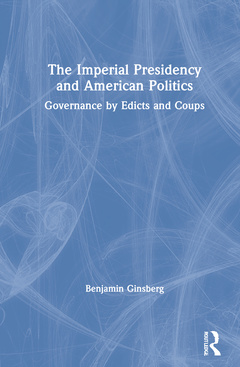The Imperial Presidency and American Politics Governance by Edicts and Coups
Auteur : Ginsberg Benjamin

Those who saw Donald Trump as a novel threat looming over American democracy and now think the danger has passed may not have been paying much attention to the political developments of the past several decades. Trump was merely the most recent?and will surely not be the last?in a long line of presidents who expanded the powers of the office and did not hesitate to act unilaterally when so doing served their purposes. Unfortunately, Trump is also unlikely to be the last president prepared to do away with his enemies in the Congress and transform the imperial presidency from a theory to a reality.
Though presidents are elected more or less democratically, the presidency is not and was never intended to be a democratic institution. The framers thought that America would be governed by its representative assembly, the Congress of the United States. Presidential power, like a dangerous pharmaceutical, might have been labelled, "to be used only when needed."
Today, Congress sporadically engages in law making but the president actually governs. Congress has become more an inquisitorial than a legislative body. Presidents rule through edicts while their opponents in the Congress counter with the threat of impeachment?an action that amounts to a political, albeit nonviolent coup. The courts sputter and fume but generally back the president. This is the new separation of powers?the president exercises power and the other branches are separated from it.
Where will this end? Regardless of who occupies the Oval Office, the imperial presidency is inexorably bringing down the curtain on American representative democracy.
Acknowledgments
Chapter 1: How the Imperial Presidency Has Poisoned American Politics
Chapter 2. The Rise of Presidential Imperialism and the Politics of Edicts and Coups
Chapter 3. Fighting to Control the Nation’s Bureaucracies
Chapter 4. How the FBI and Other Security Agencies Interfere in American Politics
Chapter 5. How the Courts Enable the Imperial Presidency
Chapter 6. The Presidency and America’s Future
Index
Benjamin Ginsberg is the David Bernstein Professor of Political Science and Chair of the Center for Advanced Governmental Studies at Johns Hopkins University, USA. He is the author, co-author, or editor of 30 books including The Fall of the Faculty; Presidential Government; Downsizing Democracy; The Captive Public; Politics By Other Means;and America’s State Governments: A Critical Look at Disconnected Democracies (Routledge, 2021).Ginsberg received his PhD from the University of Chicago in 1973 and was Professor of Government at Cornell until 1992 when he joined the Hopkins faculty.
Date de parution : 07-2021
15.2x22.9 cm
Date de parution : 07-2021
15.2x22.9 cm
Thème de The Imperial Presidency and American Politics :
Mots-clés :
North American Free Trade Agreement; FISA; Top Secret; Humpback Whale; FMLA; OIRA; Circuit Court; Issued Executive Order; Executive Congressional Agreements; Oort Cloud; Executive Agreement; DOJ; Justice Department; FISA Court; FOIA Request; America’s Social Welfare; NBC Newsman; Line Item Veto; Corona Virus; Clinton Issued Executive Order; Prism Program; Sensitive Information; Emergency Price Control Act; Private Sector Interest Groups; Superconducting Super Collider



